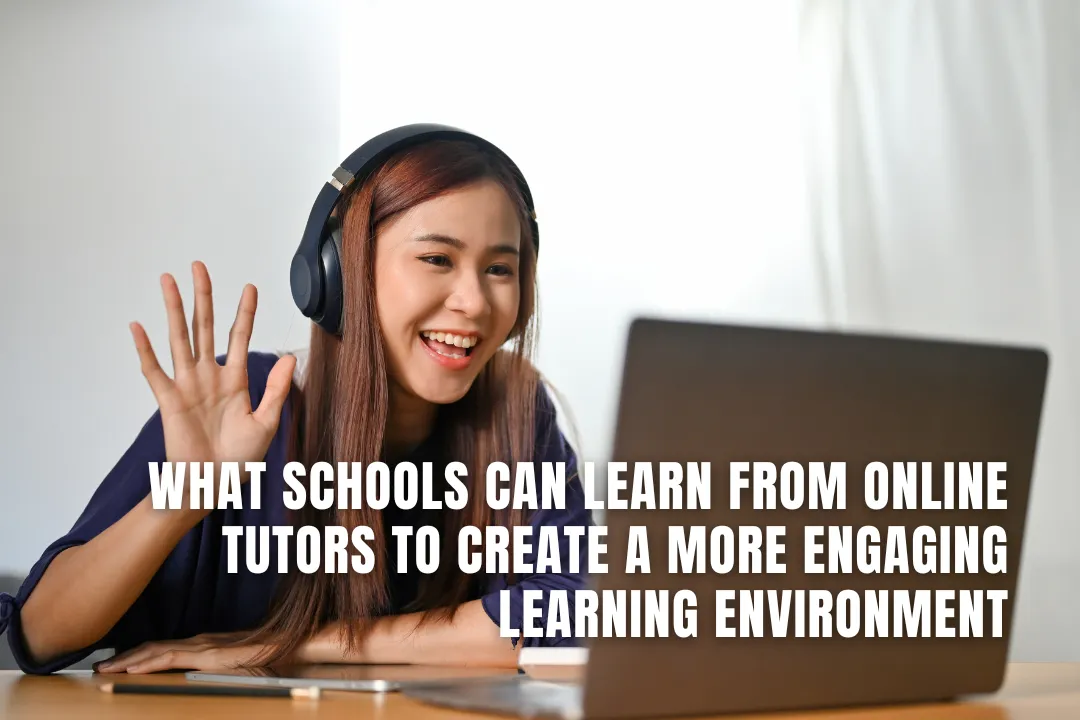What Schools Can Learn from Online Tutors to Create a More Engaging Learning Environment
December 11, 2024

Online tutoring has become an increasingly popular way to educate students, offering personalized and accessible lessons that cater to individual needs. But beyond the convenience of online learning, there are valuable lessons that traditional schools can learn from the strategies online tutors use to engage students and enhance the learning experience.
By adopting some of these practices, schools can create a more dynamic and supportive learning environment. So let’s explore what schools can learn from the world of online tutoring.
Key Takeaways: What Schools Can Learn from Online Tutors to Create a More Engaging Learning Environment
- Create Professional and Welcoming Spaces: Online tutors use organised and inviting workspaces to foster focus. Schools can replicate this by redesigning classrooms with vibrant visuals, motivational decor, and functional layouts.
- Leverage Advanced Technology: Tools like virtual whiteboards, smart boards, and tablets enhance interactivity in online tutoring. Schools can adopt similar technologies to make lessons more engaging and adaptive to student needs.
- Personalise Learning: Online tutors tailor lessons to individual students. Schools can achieve this with adaptive software, interest-based projects, and hands-on activities to keep lessons relatable and impactful.
- Encourage Open Communication: Tutors thrive on clear communication with students and families. Schools can build trust and collaboration by maintaining transparency through progress updates and fostering an environment where students feel comfortable asking questions.
Register Your LLC
Company Registration
START NOWCreating a professional and engaging learning spaces
Online tutors understand the importance of creating a professional and welcoming workspace to set the right tone for learning. Schools can apply this lesson by reimagining their classrooms and common areas to make them more inviting and motivational.
A great example is the use of wall art for schools to create a visually stimulating environment. In the same way that tutors use decor to build a positive atmosphere, schools can incorporate colorful, educational murals, motivational quotes, or subject-specific visuals to enhance engagement. Hallways can also benefit from creative signage that not only directs students but also reinforces school values and learning goals.
Using the right tools and technology in classrooms
Online tutors often rely on cutting-edge technology, like virtual whiteboards, screen-sharing tools, and high-quality audio-visual equipment, to deliver smooth and engaging lessons. Schools can benefit from a similar approach by integrating interactive tools into classrooms.
For example, smart boards, virtual whiteboards, tablets, and cloud-based learning platforms can make lessons more interactive and adaptable to different learning styles. Reliable technology also minimizes disruptions, ensuring that learning is continuous and efficient.
Personalise your lessons
One of the great things about online tutoring is its ability to tailor lessons to each student’s needs. While it’s more challenging in a classroom setting, schools can take steps to incorporate personalization into their teaching methods.
For instance, adaptive learning software can help teachers track individual student progress and offer customized exercises. Beyond technology, teachers can encourage students to pursue projects that reflect their interests, making the material more relatable and engaging.
Schools can also draw inspiration from a tutor’s ability to use creative examples to explain difficult or challenging concepts. Adding storytelling, visuals, and hands-on activities can make even the most complex subjects more accessible.
Encourage open communication
Online tutors thrive by creating open lines of communication with students and their families, ensuring everyone is on the same page in terms of progress and expectations. Schools can also improve by fostering more open communication channels between teachers, students, and parents.
Regular updates to parents about their child’s progress, combined with a welcoming environment where students feel comfortable asking questions, can help build trust and collaboration. Classroom layouts and visual cues–such as encouraging messages displayed prominently on walls–can also reinforce a culture of openness and support.
By embracing these principles that online tutors excel at, schools can create a more effective and student-focused approach to education that will boost engagement, enhance learning outcomes, encourage creativity, and build a supportive environment where students can thrive.

